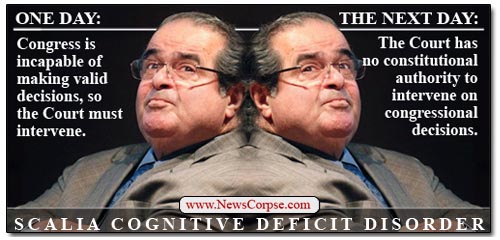The rulings today from the Supreme Court will undoubtedly dominate the part of the news cycle that isn’t filled with testimony from the George Zimmerman trial.
The decision on California’s Prop 8 was essentially a punt wherein the Court ruled that the plaintiff did not have standing to bring the case. The result is that the lower court ruling that struck down Prop 8 remains in effect and gay marriages will resume shortly in California.
The decision on the Defense of Marriage Act (DOMA) was the more profound ruling as it struck down the legislation congress had passed in an attempt to define marriage as between one man and one woman. Consequently, the federal government is now prohibited from discriminating against same-sex couples with regard to marriage.
Not surprisingly, the media has pounced on these events with analysis, interviews, and opinions from across the political spectrum. However, one fairly obvious observation seems to have been ignored by many in the mainstream press. And that is the rank hypocrisy of Justice Scalia when you juxtapose his opinion from yesterdays ruling on the Voting Rights Act (VRA) with today’s dissent on the DOMA case. On DOMA Scalia complained that…
“We have no power to decide this case. And even if we did, we have no power under the Constitution to invalidate this democratically adopted legislation […] That is jaw-dropping. It is an assertion of judicial supremacy over the people’s Representatives in Congress and the Executive.”
But just the day before Scalia had signed on to the Court’s majority decision to strike down the Voting Rights Act – which, of course, was democratically adopted legislation by the people’s representatives. In fact, the law was just reauthorized by congress in 2006 with a vote in the senate of 98-0 and in the House by 390-33. The reauthorization was signed by then-President George W. Bush who effusively praised the bill.
Nevertheless, Scalia condemned the VRA previously despite its broadly bi-partisan approval in congress. He belittled it as a “racial entitlement” that was somehow immune to the “normal political process.” He even noted the huge majority vote it received, but portrayed that with derision as if it were a defect.
“And this last enactment – not a single vote in the Senate against it. And the House is pretty much the same. Now, I don’t think that’s attributable to the fact that it is so much clearer now that we need this. […It is] a phenomenon that is called ‘perpetuation of racial entitlement.’ Whenever a society adopts racial entitlements, it is very difficult to get out of them through the normal political process.”
So on one day Scalia takes a position that congress is incapable of making valid decisions on behalf of the people and, consequently, the Supreme Court must step in to make the decisions for them. That was his justification for striking down the VRA. However, the very next day Scalia bitterly castigates his colleagues for taking action to invalidate a law that had been enacted by the people’s representatives, and he repudiated the notion that it is the Court’s role to second guess the congress. That was the gist of his dissent on DOMA.
Literally overnight, Scalia went from asserting the Court’s authority over congressional actions, to asserting that the Court had no such authority. So the question is: Is that just Scalia being a hypocritical jerk, or is the 77 year old jurist suffering from a cognitive disorder?



That’s what happens when ideology conflicts with principles. In Scalia’s case, it’s ideology that holds sway more often than not.
I think Scalia is a fraud: he’s supposed to be an “originalist,” but allowing corporations to fund political campaigns based on a 1976 case that absurdly conflated spending money with free speech is certainly not the original intent of anyone but corporate plutocrats, Scalia’s real supporters.
I agree; about the ideology and the fraud thing. His ego controls him and he can’t help himself.
I also think if he didn’t want to be thought of as making rulings that portray him as a racist, he shouldn’t make racist rulings.
Those at The American Prospect caught this hypocrisy:
Too bad Scalia is closed off from criticism.
E. J. Dione has picked up on the obvious, which I alluded to w/r/t Scalia above:
And the drift to fascism continues.
How right you are.
My concern is how the court or the media never corrected themselves regarding marriage. The one man, one woman marriage kick came from the silver screen in shows such as, “Leave It to Beaver”. There idea of marriage is not over 1000 years old; it is more like 60 years old.
Penn and Teller did an entire show about it. There are even those in their thirties who romance this stuff.